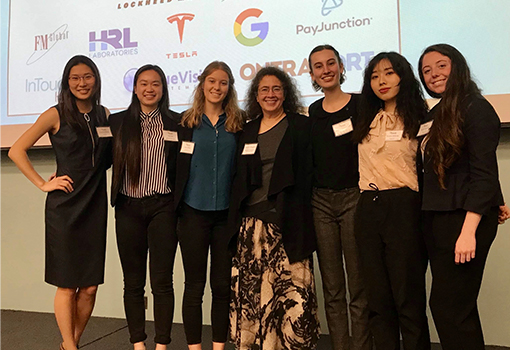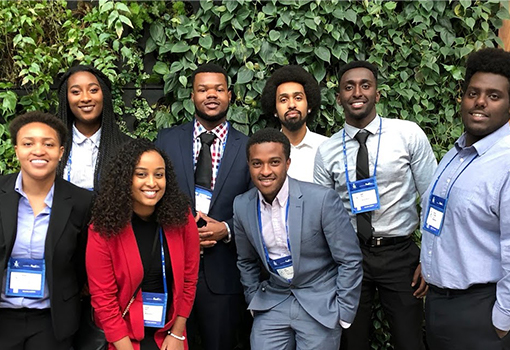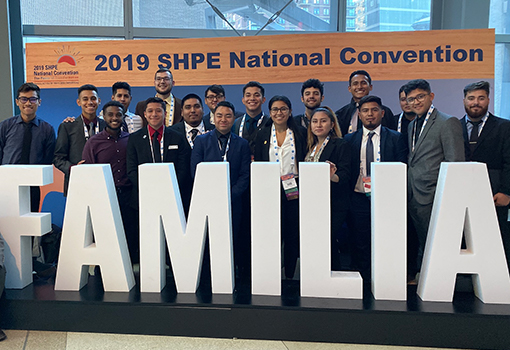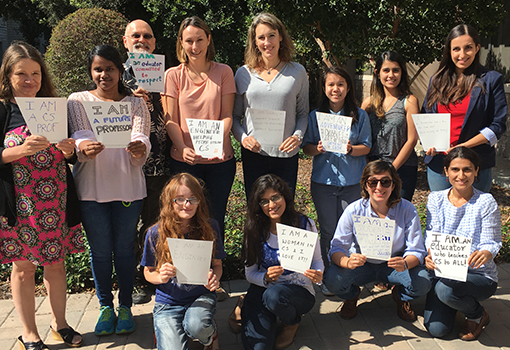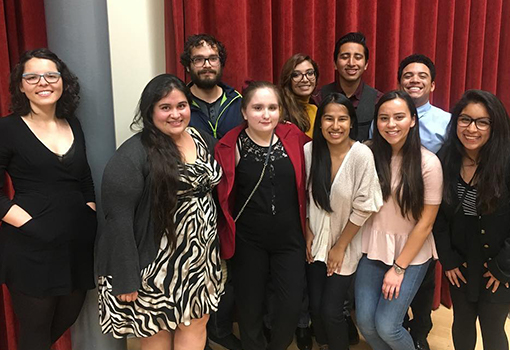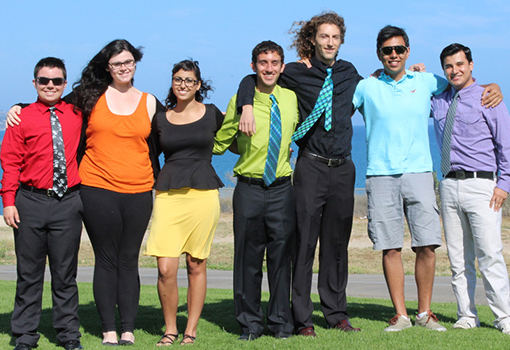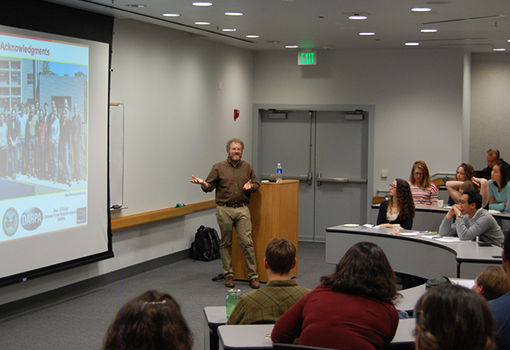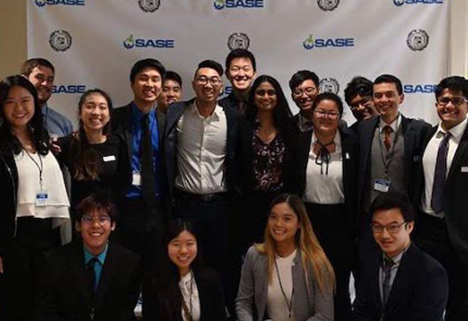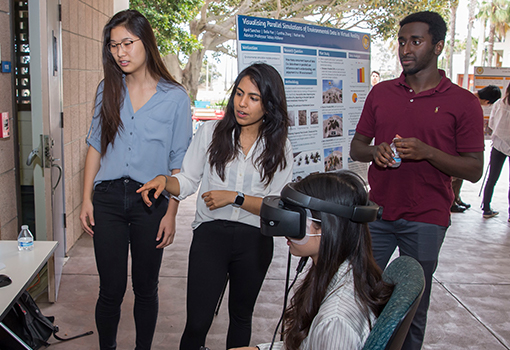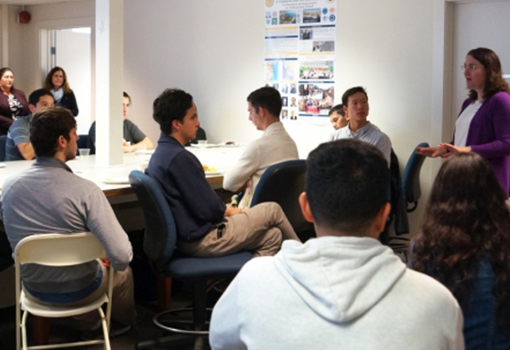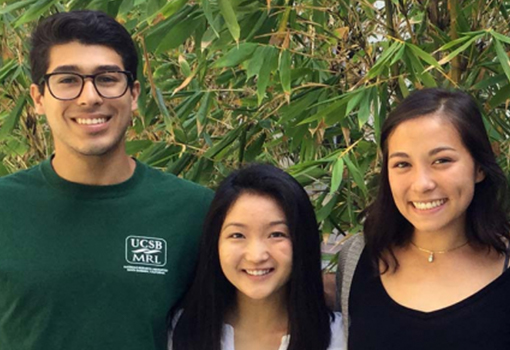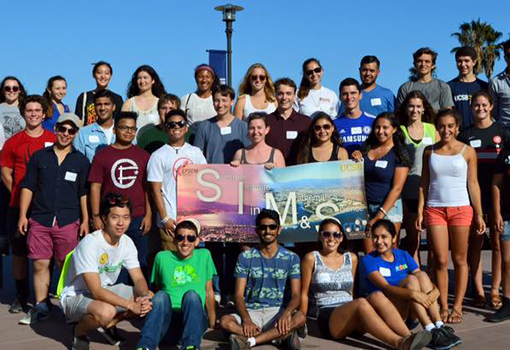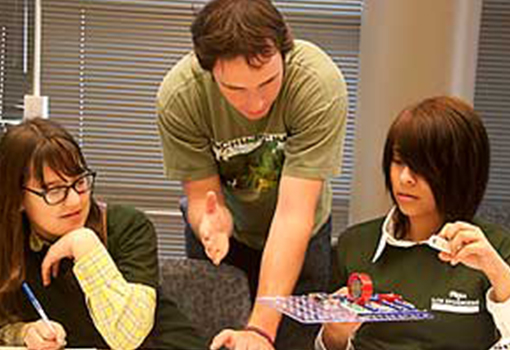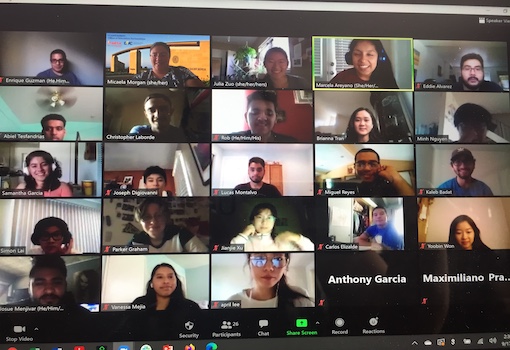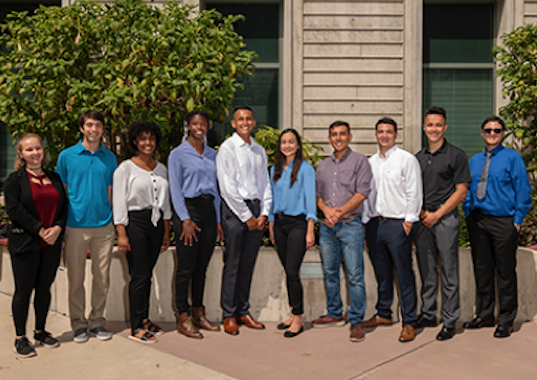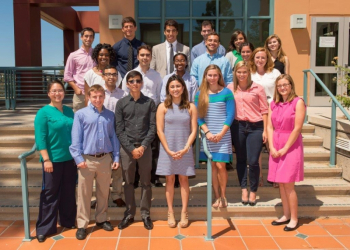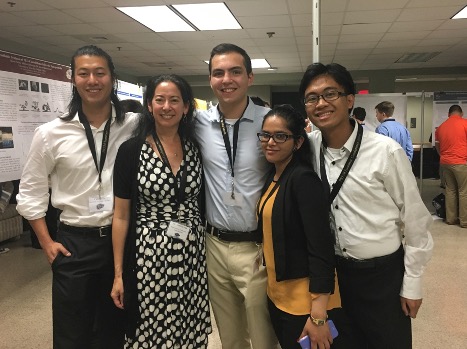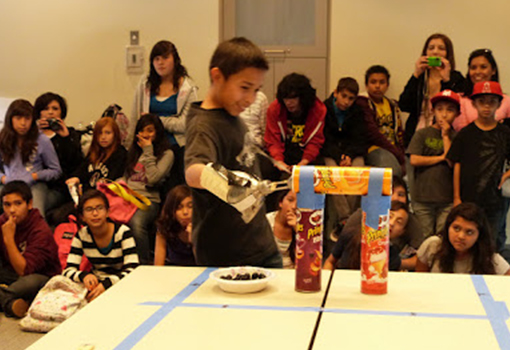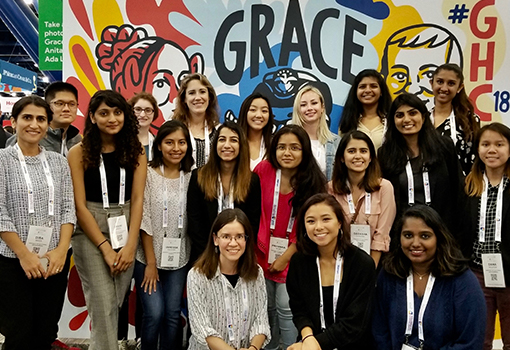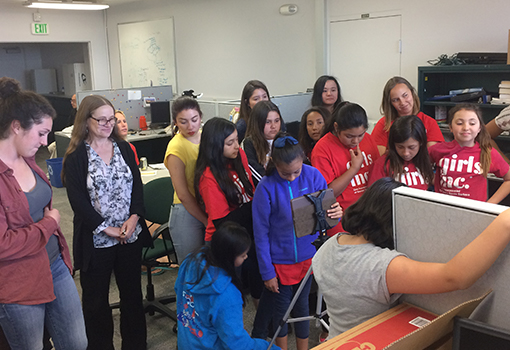There are many programs and resources available to undergraduate and graduate engineering students to enhance student success. Listed below are descriptions of numerous programs, student organizations, and activities, as well as first-hand accounts from students who were positively impacted by them. To add an organization, activity, or program, please email the CoE Marketing Department.
Student Organizations
Society of Women Engineers (SWE)
SWE seeks to increase the representation of women in engineering by providing mentorship, creating a sense of community for members, and raising awareness of and interest in the field through outreach events., such as the annual Evening with Industry, when members can network with representatives from Google, Oracle, InTouch Health, and other top firms. The benefits are clear to SWE internal vice president, Ines Bilkic, who says, “As someone who was previously super afraid of talking to recruiters, I found SWE to be instrumental in encouraging me to work on these skills, and I was able to practice them at events like the national conference, mock interviews, and Evening with Industry."
NATIONAL SOCIETY OF BLACK ENGINEERS (NSBE)
NSBE seeks to increase the number of culturally responsible Black engineers and scientists who excel academically, succeed professionally, and positively impact the community. The organization fosters peer collaboration and mentorship in an effort to help members succeed during and after college. Members also have an opportunity to attend the National NSBE Annual Conference, which showcases Black students and professionals who are channeling their dedication to advance their communities and society at large.
Los Ingenieros (LI)
LI, UCSB’s joint chapter of the Society of Hispanic Professional Engineers (SHPE) and Latinos in Science and Engineering (MAES), is dedicated to empowering underrepresented students to realize their potential as valued figures and role models in STEM. Members say they strive to create a sense of family away from home, which they call “FamiLIa,” incorporating the organization’s initials into the Spanish word for family. “Having welcoming spaces like LI is important for students who are leaving their homes and coming to a new place,” says co-chair Balfred Carrillo Martinez. “The LI community brings STEM students at UCSB together to grow both professionally and personally. There is no Life without LI!”
Women in Computer Science (WICS)
WICS allows undergraduate and graduate students to work together with faculty to build a strong and vibrant community. Students benefit by finding mentors, learning about navigating academics, planning their careers, and discussing diversity-related issues. “Organizations like WICS are crucial to changing the culture in engineering to be more inclusive,” says Associate Teaching Professor Diba Mirza, one of the group’s four faculty advisers. “They provide a safe space for marginalized students to discuss issues that affect them, and to find role models and mentors. They are concrete steps toward addressing the lack of diversity in academia and research.”
Society for Advancement of Chicanos and Native Americans in Science (SACNAS)
UCSB hosts both undergraduate and graduate student chapters of SACNAS. The chapters provide support, resources, and opportunities for underrepresented students through professional development, as well as through social and outreach events. The undergraduate chapter has received national role-model awards for outstanding regional networking, outstanding governance, long-term stability, being the most active chapter, and for the most-exemplary effort to promote student success. Says SACNAS co-chair Marcus Condarcure, “Our SACNAS chapter cares for the success and well-being of our members. We foster an inclusive and friendly community for students from multiple backgrounds and disciplines. We also provide opportunities and support for our members’ academic and professional goals.”
OUT IN SCIENCE, TECHNOLOGY, ENGINEERING, AND MATHEMATICS (OSTEM)
oSTEM promotes, supports, and empowers LGBTQ+ individuals and their allies in pursuing STEM disciplines. The organization provides resources, mentors, and a sense of community to students, who can also attend the annual national conference to connect with other chapter members and learn about professional and academic opportunities. “LGBTQ+ representation is sparse in STEM disciplines,” says Kelsey Koutsoukos, the oSTEM vice president. “By establishing an organization dedicated to promoting the participation and development of these individuals in STEM, we can build a diverse and inclusive community of students, researchers, and scientists.”
Graduate Students for Diversity in Science (GSDS)
GSDS includes an interdisciplinary group of young scientists who recognize the importance of inclusion in STEM fields and the need to foster an inclusive atmosphere that celebrates diversity. Supported by the Dow Foundation, GSDS hosts a distinguished lecture series to honor world renowned scientists who belong to underrepresented groups.
Society of Asian Scientists and Engineers (SASE)
The SASE student chapter at UCSB was founded in January 2015 with a mission to provide STEM students with opportunities promoting academic support, community involvement, and professional development. The chapter also focuses on building a supportive community that allows students to find social engagement, develop as leaders, and connect to the larger SASE network across the nation through conferences and other events.
Programs
Early Research Scholars Program (ERSP)
ERSP, overseen by the Computer Science Department, is a year-long research apprenticeship program designed for undergraduates, especially those from groups that have been traditionally underrepresented in the field. Students complete a group project over a single academic year, which allows them to go deeper into an area of computer science and work closely with expert mentors. “I have not met a person who goes into ERSP and regrets it. People get so many long-lasting benefits, especially those who are new to computer science and research,” said April Sanchez, who worked on the Human-Computer Interaction team, which explored how the amount of data shown in a virtual setting affects a person’s understanding of the data itself. “It was really empowering. Being exposed to these events and getting to meet so many different people really inspired me and gave me a lot of opportunities to grow."
Enhancing Success in Transfer Education for Engineering Majors (ESTEEM)
ESTEEM is a scholarship and support program for academically talented, low-income, first-generation transfer students who are majoring in engineering. ESTEEM is offered in partnership with four regional community colleges that, along with UCSB, are Hispanic-Serving Institutions (HSIs): Allan Hancock College, Oxnard College, Santa Barbara City College, and Ventura College. “ESTEEM was one of the best resources I had at UCSB. The program directly connects students with industry professionals, ensures academic success by providing tutors and a private study space, and provides a stipend to relieve some of the financial stress college can bring,” said James Cruz, who transferred to UCSB from Moorpark College and now works as a mechanical engineer for the Naval Surface Warface Center (NAVSEA). “As an engineering student, a supportive cohort is the key to success. ESTEEM provides just that. The benefits of being an ESTEEM member continue with you until you graduate.”
Maximizing Access to Research Careers – Undergraduate Student Training in Academic Research (MARC U*STAR)
The MARC U*STAR program is designed to increase the number of highly trained scientists from disadvantaged or underrepresented backgrounds by improving their preparation for PhD graduate training at outstanding universities nationwide. Each scholar receives an annual research stipend and is mentored by a faculty member, who assists the student in designing a plan of research and enrichment activities fitted to the individual’s interests and goals. During the two-year program, students participate in professional development workshops and research seminars, and build effective communication skills. “Becoming involved in research has definitely been one of the most impactful experiences for me, solidifying my aspirations to apply to graduate school and pursue research as a career,” said Jessica Wong, an alumna of the chemical engineering program, who worked on a project to improve blood glucose monitoring systems. “Even more incredible and exciting than the work we do is being able to talk with faculty one-on-one and form a relationship that really ends up inspiring me and helps me see what a life in research might be like.”
Summer Institute in Mathematics and Science (SIMS)
SIMS was designed to challenge high-achieving incoming UCSB freshmen from groups that have traditionally been underrepresented in STEM. All students participate in activities and training to promote the development of effective academic skills, especially during their critical first year. Students in the three-week program receive introductions to university calculus, chemistry, physics, and technical writing, and also work with graduate student mentors in small research groups to gain first-hand knowledge of the campus research culture and community. “SIMS channeled the freshman college experience by creating opportunities and conditioning us to seize them so that we could set ourselves apart at the highest level academically,” says Melissa Morales, a chemical engineering major who later participated in the Early Undergraduate Research Experience and Knowledge Acquisition internship program. “Through SIMS, I was introduced to a passionate group of friends and a network of industry professionals, academic researchers, and staff willing to share their career paths with me. That two-week research experience gave me a strong foundation and the diverse network of support I wanted.
Mathematics Engineering Science Achievement (MESA) University Program
MESA is an undergraduate retention program for students who are first-generation college students within a STEM major. Staff and faculty work together to increase students’ awareness of and access to programs and services that help ensure their success. Activities include academic excellence and professional-development workshops, academic and career advising, and networking events.
MESA Successful Transition Program (M-STP)
M-STP is a three-week undergraduate retention program for first-generation college students in STEM majors. The program prepares incoming freshmen and transfer students to succeed in their first-year courses by providing short courses in math, physics, technical writing, and college success. Program participants also learn about campus resources and network with other UCSB students and alumni, as well as industry partners. The goal of the program is to ensure that first-generation college students get a strong start on their path to success. The above image is from a virtual meeting M-STP held over in fall 2020 during the COVID-19 pandemic.
California Alliance for Minority Participation (CAMP)
CAMP provides resources and opportunities to underrepresented students in the science, technology, engineering, and mathematics fields. The program provides research internships during the summer and academic year to assist students toward successful completion of STEM degrees. The program is sponsored by the Louis Stokes Alliances for Minority Participation at the National Science Foundation and is part of the statewide CAMP program. “Being a first-generation college student and Latina in the STEM field, it was often difficult to imagine possibilities for myself in the field. Participating in CAMP gave me a sense of belonging, provided me with an excellent framework for gaining first-hand experience in a research project, and confirmed my passion for research in neuroscience,” said Jacqueline Beltran, who received a bachelor’s degree in biopsychology in 2019. “While I was only a part of CAMP for a year, I left with a network of support as well as empowered to continue working towards a career as a research scientist.”
Research Internships in Science and Engineering (RISE)
UCSB Science and engineering students acquire research experience in a variety of fields through RISE internships. Interns meet regularly to share their experiences and report on their progress. In addition to their research responsibilities, interns participate in professional development workshops and give research presentations to a broad audience. Interns often present their research at national conferences. The RISE program is sponsored by the Materials Research Laboratory. “I am really grateful that I have gotten the chance to participate in RISE, as it has connected me with other undergraduate researchers and given me opportunities to develop my scientific communication skills,” said Vedika Shenoy, a chemical engineering major. “I especially appreciated the chance to participate in RISE during Spring 2020, when everyone was operating remotely — thanks to RISE, I didn't feel nearly as isolated when participating in undergraduate research.”
Partnership For Research And Education In Materials (PREM)
PREM promotes research and education exchanges between the UCSB Materials Research Lab and our minority serving partner institutions at Jackson State University (Jackson, MS) and the University of Texas at El Paso. The program provides funded summer research experiences for UCSB undergraduates at UTEP, as well as for JSU and UTEP students to participate in internship programs at the Materials Research Lab. "PREM was my first exposure to research, and I had a great set of mentors to help get me started to to help me progress into a contributor to the lab with a good degree of autonomy," said Alex Hattori, a chemical engineeing major at UCSB, who spent the summer after his sophomore year at UTEP through the PREM program. "I picked up a ton of skills related to reading scientific papers, conducting experiments, thinking up new experiments, and presenting results in a formal manner through both lab group presentations and the poster symposium toward the end of my internship. I also had a ton of fun exploring chemistry related to semiconductor synthesis pathways, which impacted my decision to pursue an electronic materials degree and work on solar renewable energy technologies."
Activities
Destination College! Science & Technology MESA Day
Five hundred pre-college, underrepresented, first-generation college-bound students converge on the UCSB campus as part of Destination College Science and Technology MESA Day. Student members of Los Ingenieros (LI), National Society of Black Engineers (NSBE), Society for the Advancement of Chicanos and Native Americans in Science (SACNAS), and out in Science Technology Engineering and Math (oSTEM) host the action-packed day. They learn about preparing for college and the application process, and they participate in hands-on interactive workshops and demonstrations. “MESA Day requires a lot of hard work and dedication from student organizations, but it’s worth it to expose the next generation of scientists and engineers to the wonders of STEM,” says Jorge Jimenez Mejia, co-chair of Los Ingenieros. “The students get to be scientists for a day and experience what college is like. We want to inspire them to go into the science fields.”
Grace Hopper Celebration for Women in Computing Conference
Each year, Women in Computer Science (WICS), with the Computer Science Department’s support, organizes a trip to take a large group of computer science undergraduates, graduate students, and faculty to the Grace Hopper Celebration for Women in Computing Conference. Nearly twenty thousand women technologists from industry and academia attend the three-day event, which features keynote speakers, workshops, networking events, and a career fair. “I came to GHC with the hope of having fun, learning more about the computing field, and meeting a diverse group of women. But I left with so much more than that!” said Dana Nguyen ( BS/MS ’20). “It’s not just a conference for women technologists; it’s a celebration for all of us who have defied the odds and continue to shoot for the stars! I am eternally grateful to the department for allowing me to be a part of this.”
GIRLS, Inc.
For the past several years, Linda Petzold, the Mehrabian Distinguished Professor of Mechanical Engineering and Computer Science, has invited members of Girls, Inc. to campus and to visit her research lab. The local non-profit organization aims to empower girls by providing them with support, mentorship, and guidance. “I want to show students that science and research are fun. I also want to make it clear to them that science and engineering are open to anyone who wants to pursue it,” says Petzold.
National conferences
One of the highlights of the year for members of student organizations is to attend national conferences. The annual events unite hundreds of students and faculty from universities across the nation. They have an opportunity to network with members of industry and distinguished faculty, and attend workshops, presentations, and career fairs. The College of Engineering sponsored six students to attend the 2020 Society of Women Engineers Conference (WE20). The virtual event made a lasting impression on the students. “This event taught me how engineering opens up various academic and career paths,” said Ritika Mitra, a freshman chemical engineering student. “After attending this fair, I felt that chemical engineering is the best major for me. I aspire to be like the female role models at the conference so that I can inspire the next generation of girls to pursue STEM.

